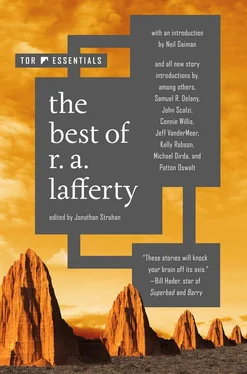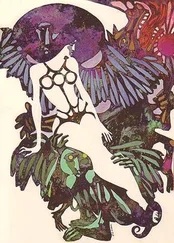“_ _ _ _ _ _ _ is the best policy” didn’t mean a thing to him. He couldn’t remember the names of the companies that he had his own policies with.
“A _ _ _ _ _ _ in time saves nine” contained more mathematics than Albert could handle. “There appear to be six unknowns,” he told himself, “and only one positive value, nine. The equating verb ‘saves’ is a vague one. I cannot solve this equation. I am not even sure that it is an equation. If only I had with me my—”
But he hadn’t any of his gadgets or machines with him. He was on his own. He left half a dozen other proverb fill-ins blank. Then he saw a chance to recoup. Nobody is so dumb as not to know one answer if enough questions are asked.
“_ _ _ _ _ _ _ _ _ is the mother of invention,” it said.
“Stupidity,” Albert wrote in his weird ragged hand. Then he sat back in triumph. “I know that Eurema and her mother,” he snickered. “Man, how I do know them!”
But they marked him wrong on that one too. He had missed every answer to every test. They began to fix him a ticket to a progressive booby hatch where he might learn to do something with his hands, his head being hopeless.
A couple of Albert’s urbane machines came down and got him out of it. They explained that, while he was a drifter and a derelict, yet he was a rich drifter and derelict, and that he was even a man of some note.
“He doesn’t look it, but he really is—pardon our laughter—a man of some importance,” one of the fine machines explained. “He has to be told to close his mouth after he has yawned, but for all that he is the winner of the Finnerty-Hochmann Trophy. We will be responsible for him.”
Albert was miserable as his fine machines took him out, especially when they asked that he walk three or four steps behind them and not seem to be with them. They gave him some pretty rough banter and turned him into a squirming worm of a man. Albert left them and went to a little hide-out he kept.
“I’ll blow my crawfishing brains out,” he swore. “The humiliation is more than I can bear. Can’t do it myself, though. I’ll have to have it done.”
He set to work building a device in his hide-out.
“What you doing, boss?” Hunchy asked him. “I had a hunch you’d come here and start building something.”
“Building a machine to blow my pumpkin-picking brains out,” Albert shouted. “I’m too yellow to do it myself.”
“Boss, I got a hunch there’s something better to do. Let’s have some fun.”
“Don’t believe I know how to,” Albert said thoughtfully. “I built a fun machine once to do it for me. He had a real revel till he flew apart, but he never seemed to do anything for me.”
“This fun will be for you and me, boss. Consider the world spread out. What is it?”
“It’s a world too fine for me to live in any longer,” Albert said. “Everything and all the people are perfect, and all alike. They’re at the top of the heap. They’ve won it all and arranged it all neatly. There’s no place for a clutter-up like me in the world. So I get out.”
“Boss, I’ve got a hunch that you’re seeing it wrong. You’ve got better eyes than that. Look again, real canny, at it. Now what do you see?”
“Hunchy, Hunchy, is that possible? Is that really what it is? I wonder why I never noticed it before. That’s the way of it, though, now that I look closer.
“Six billion patsies waiting to be took! Six billion patsies without a defense of any kind! A couple of guys out for some fun, man, they could mow them down like fields of Albert-Improved Concho Wheat!”
“Boss, I’ve got a hunch that this is what I was made for. The world sure had been getting stuffy. Let’s tie into it and eat off the top layer. Man, we can cut a swath.”
“We’ll inaugurate a new era!” Albert gloated. “We’ll call it the Turning of the Worm. We’ll have fun, Hunchy. We’ll gobble them up like goobers. How come I never saw it like that before? Six billion patsies!”
The Twenty-First Century began on this rather odd note.
SELENIUM GHOSTS OF THE EIGHTEEN SEVENTIES
Introduction by Kelly Robson
I live in the future.
In 1978, when “Selenium Ghosts of the Eighteen Seventies” was first published, I was ten years old. My family lived in the forest-fire-prone foothills of the Canadian Rockies, in the echo path of wolf howls and coyote yips. That close to the mountains, radio signals aren’t reliable. Aside from the telephone, our only connection to the outside world was the TV. And oh boy, did we love it.
We had one channel, the Canadian Broadcasting Corporation. The CBC’s programming wasn’t particularly inspiring—mostly homegrown shows like The Beachcombers and Front Page Challenge, with a few American shows like M.A.S.H . scattered like jewels across prime time. We were always disappointed when the shows went into repeats because we had no alternative. But we were kids. We would watch anything. My brother earned the nickname pattern-watcher because when the channel got knocked off the air, he would literally stare at the static pattern.
I would too, from time to time. Occasionally, if I stared long enough, I’d see things in there.
“Selenium Ghosts of the Eighteen Seventies” is an alternate history of television. The narrator is an unnamed historian (probably amateur) who describes the television shows produced by Aurelian Bentley in 1873. These selenium “slow light” dramas are transmitted to television receivers that will repeat anything they receive. Thrillingly, because of the quirks of slow light, the more the receivers repeat the dramas, the better they become. They evolve and grow. The picture becomes clearer. The once-silent productions begin to develop sound. They also develop metacommentary, breaking the fourth wall and letting us into the inner workings of The Wonderful World of Aurelian Bentley .
What a thrilling science fictional concept. My brothers and sisters and I would have embraced this technology in 1978. We would have watched those “slow light” dramas until they became so real we could have walked into their world.
This is Lafferty at his most delightful, playing with words and images to build a multilayered story within a story (within a story) that seems real despite its stylized, melodramatic trappings. I try to forgive Lafferty the use of troubling racial epithets (should I?) even though they throw me out of the story (in 1978, no, there was no excuse), because he touches my world to his. Lafferty makes me remember my entertainment-starved youth, where we would have done anything for a TV show that changed and even got better in repeat. And he makes me appreciate anew the wonder of this future I live in, where I carry in my pocket a receiver that will bring me, at a moment’s notice, all the television anyone could ever want.
Selenium Ghosts of the Eighteen Seventies
Even today, the “invention” of television is usually ascribed to Paul Nipkow of Germany, and the year is given as 1884. Nipkow used the principle of the variation in the electrical conductivity of selenium when exposed to light, and he used scanning discs as mechanical effectors. What else was there for him to use before the development of the phototube and the current-amplifying electron tube? The resolution of Nipkow’s television was very poor due to the “slow light” characteristics of selenium response and the lack of amplification. There were, however, several men in the United States who transmitted a sort of television before Nipkow did so in Germany.
Resolution of the images of these even earlier experimenters in the field (Aurelian Bentley, Jessy Polk, Samuel J. Perry, Gifford Hudgeons) was even poorer than was the case with Nipkow. Indeed, none of these pre-Nipkow inventors in the television field is worthy of much attention, except Bentley. And the interest in Bentley is in the content of his transmissions and not in his technical ineptitude.
Читать дальше




![Рафаэль Лафферти - Дни, полные любви и смерти. Лучшее [сборник litres]](/books/385123/rafael-lafferti-dni-polnye-lyubvi-i-smerti-luchshe-thumb.webp)
![Рафаэль Лафферти - Лучшее [Сборник фантастических рассказов]](/books/401500/rafael-lafferti-luchshee-sbornik-fantasticheskih-ra-thumb.webp)